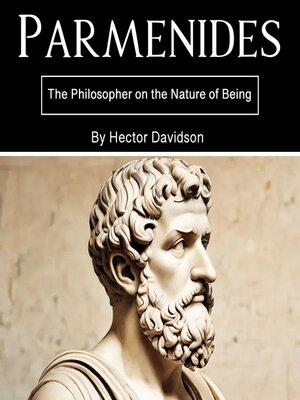
Sign up to save your library
With an OverDrive account, you can save your favorite libraries for at-a-glance information about availability. Find out more about OverDrive accounts.
Find this title in Libby, the library reading app by OverDrive.



Search for a digital library with this title
Title found at these libraries:
| Library Name | Distance |
|---|---|
| Loading... |
Parmenides of Elea stands as one of the most pivotal figures in the history of Western philosophy. His contributions, particularly in metaphysics and epistemology, challenged the prevailing philosophical ideas of his time and laid the groundwork for later philosophical inquiries. Born in the late sixth or early fifth century BCE, Parmenides is best known for his poem On Nature, in which he articulates a radical vision of reality that denies change, multiplicity, and the reliability of sensory perception. His assertion that "what is, is" and "what is not, is not" forms the core of his philosophical system, establishing the principle that true being must be eternal, unchanging, and indivisible.
Prior to Parmenides, early Greek thinkers, particularly the Presocratics like Heraclitus and the Milesian philosophers, sought to explain the nature of reality through empirical observation and the identification of a fundamental substance or element underlying all things. Heraclitus, for example, famously posited that change and flux were the fundamental aspects of existence, encapsulated in the notion that "everything flows." Parmenides, however, forcefully rejected this view, arguing that change and plurality were mere illusions. He insisted that the senses deceive us, leading to a mistaken belief in a world of becoming rather than a singular, unchanging being. His philosophical method, based on reason rather than empirical observation, introduced a new way of thinking that would profoundly influence later philosophical traditions.
The significance of Parmenides lies not only in the content of his arguments but also in the impact he had on subsequent thinkers. Plato, for instance, engaged extensively with Parmenidean thought, particularly in dialogues such as the Parmenides and Sophist, where he sought to reconcile the Eleatic notion of an unchanging reality with the apparent diversity of the world.







